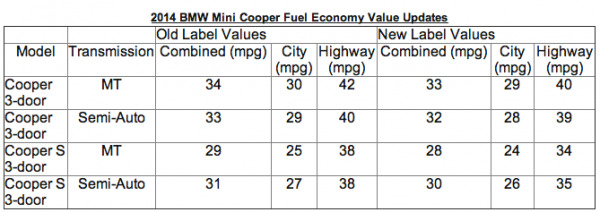The Mini Cooper just got a spanking
BMW has been forced to change its fuel economy ratings for select 2014 Mini Cooper models, after the US Environmental Protection Agency (EPA) did some testing of its own and found the German firm had over-estimated exactly how frugal the distinctive car could be. The audit covered four 3-door versions of the Mini – the Cooper and Cooper S – and was started after the EPA spotted several road-load conditions in BMW's own testing didn't meets its standards. As a result, the mpg figures for the cars will drop by as many as 4 points.
The EPA cites various factors including aerodynamic drag, tire rolling resistance, and driveline friction that exceeded its own audit criteria. Both it and BMW put the cars back through testing – using the road-loads determined in the production vehicle audit – and, though they met emissions standards, they didn't quite hit the same economy numbers as BMW first claimed.
The biggest change will be for the Mini Cooper S 2.0L with the manual transmission, which sees its highway mileage drop to 34 mpg. Most of the others drop a point or two.

While most drivers know that the official economy figures usually bear little resemblance to what they'll actually get out on proper roads, that's not to say the penalties for getting it wrong – or, worse still, misleading on them – are minor.
Kia and Hyundai, for instance, earmarked $412m after the EPA found they had exaggerated the economy potential of their cars, even though the mileages themselves were only out by 1-4 mpg for the most part. The scale of the issue – around 900,000 affected cars in all – didn't help either Korean company's cause.
Meanwhile, Ford found itself having to push out a firmware update to its 2013 hybrids after the EPA decided the cars had been programmed to deliver good test results rather than good real-world performance.
SOURCE EPA
